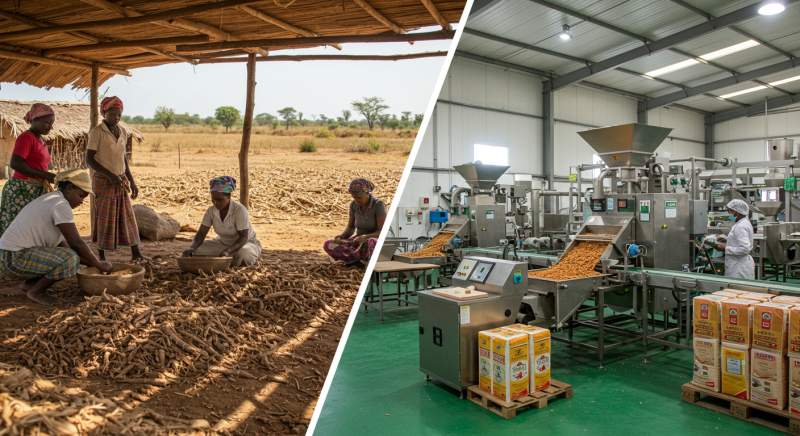Key Takeaways:
- The Nigerian economy is creating new opportunities in technology, agriculture, renewable energy, and service sectors
- Starting a business requires understanding market gaps, capital requirements, and regulatory frameworks
- Digital transformation is driving growth across multiple sectors, creating first-mover advantages
- Localized solutions addressing uniquely Nigerian challenges often yield the highest returns
- Businesses with export potential can tap into both local and international markets for accelerated growth
Finding Your Place in Nigeria’s Economic Renaissance
Standing at the crossroads of opportunity and uncertainty, millions of Nigerians wake up each day with entrepreneurial dreams that remain frustratingly out of reach. In a country where youth unemployment hovers around 33% and economic volatility seems constant, identifying truly viable profitable business ideas in Nigeria can feel like searching for diamonds in the Sahara. Yet beneath the challenges lies tremendous potential for those who can identify emerging trends and align them with Nigeria’s unique needs and resources. The entrepreneurial landscape in 2025 offers distinctive opportunities that didn’t exist even five years ago, shaped by shifting consumer behaviors, technological adoption, and policy developments. This guide explores ten profitable business ideas in Nigeria that stand out for their growth potential, sustainability, and ability to solve genuine problems in Africa’s largest economy.

Understanding Nigeria’s Business Environment in 2025
Before diving into specific profitable business ideas in Nigeria, it’s crucial to understand the macroeconomic forces shaping the business environment. Nigeria’s economy in 2025 continues its gradual diversification away from oil dependency, with significant growth in the service sector, agricultural processing, and technology adoption. According to the Nigerian Bureau of Statistics, the non-oil sector now contributes approximately 93% to the country’s GDP, creating more balanced economic opportunities [Source: https://nigerianstat.gov.ng/economic-reports/].
Several factors make 2025 a particularly interesting time for new business ventures:
- Continued digital transformation with internet penetration exceeding 65%
- Growing middle class with increased purchasing power in urban centers
- Implementation of the African Continental Free Trade Area (AfCFTA) opening new export markets
- Relatively stable political environment following the 2023 elections
- Increased focus on local manufacturing and import substitution
These factors collectively create favorable conditions for certain types of businesses while presenting challenges for others. The most profitable business ideas in Nigeria will leverage these trends while addressing persistent pain points in the Nigerian marketplace.
1. Agro-Processing with Export Capacity
Agriculture has always been Nigeria’s hidden giant, employing approximately 70% of the workforce but contributing disproportionately less to GDP due to value chain inefficiencies. One of the most profitable business ideas in Nigeria involves transforming agricultural commodities into processed goods with longer shelf lives and export potential.
Why It Works in 2025
The implementation of AfCFTA has reduced barriers to intra-African trade, creating new markets for Nigerian processed foods. Simultaneously, the government’s focus on reducing food importation has created protected market spaces for local producers. Agro-processing businesses focusing on export-quality packaging and international certification are especially well-positioned.
Specific Opportunities
Cassava processing for industrial starch and ethanol production has seen profit margins of 25-30% in recent years. Other high-potential areas include dried fruit production, spice processing, and shea butter extraction. A medium-scale cassava processing plant requires initial capital of approximately ₦15-20 million but can generate annual revenues exceeding ₦50 million when operating at full capacity [Source: https://www.nigeriaagricultureawards.org/reports/].
Implementation Approach
Start with a feasibility study focusing on specific products with established market demand. Engage with the Nigerian Export Promotion Council (NEPC) to understand export requirements and potential incentives. Consider beginning with contract processing for established brands before developing your own product lines.
2. Renewable Energy Solutions

Nigeria’s chronic power challenges have created a massive market for alternative energy solutions. With only 55% of the population having reliable access to electricity, renewable energy represents one of the most profitable business ideas in Nigeria with genuine social impact potential.
Why It Works in 2025
Government incentives for renewable energy adoption, including tax breaks and import duty reductions, have improved the financial viability of these businesses. Additionally, commercial and residential customers increasingly prefer sustainable solutions given the rising costs and unreliability of grid power.
Specific Opportunities
Solar installation and maintenance services targeting residential compounds and small businesses show profit margins of 20-25%. Solar equipment retail with financing options has also emerged as a high-growth segment. Battery storage solutions and energy management systems represent newer niches with less competition.
According to the Rural Electrification Agency, Nigeria’s renewable energy market is projected to be worth over $9 billion by 2025, with annual growth rates exceeding 20% [Source: https://rea.gov.ng/market-opportunity/].
Implementation Approach
Begin by acquiring technical expertise and necessary certifications in renewable energy installation. Partner with international equipment manufacturers seeking Nigerian distribution channels. Consider innovative financing models such as pay-as-you-go systems to make solutions accessible to more customers.
3. E-Commerce Specialization
While general e-commerce faces challenges in Nigeria due to logistics and payment hurdles, specialized e-commerce focusing on specific product categories or customer segments represents one of the most profitable business ideas in Nigeria for 2025.
Why It Works in 2025
Internet penetration has reached critical mass with over 65% of Nigerians now online, and digital payment adoption has accelerated following the 2023 currency redesign. Logistics infrastructure has improved significantly, making last-mile delivery more reliable in urban centers.
Specific Opportunities
Specialized marketplaces focusing on authentic African fashion, handcrafted home décor, or organic beauty products show particular promise. Vertical e-commerce focusing on specific professional equipment (medical, construction, or agricultural) also demonstrates strong growth potential with lower customer acquisition costs than general platforms.
Reports from the Lagos Business School indicate that specialized e-commerce platforms achieve 30-40% higher customer retention rates compared to general marketplaces [Source: https://lbs.edu.ng/research/industry-reports/].
Implementation Approach
Begin with thorough market research to identify underserved product categories. Focus on building a distinctive brand identity and superior customer service rather than competing solely on price. Develop relationships with reliable logistics partners before launch, and consider starting with a focused geographical area before expanding.
4. Healthcare Technology Services
Nigeria’s healthcare sector combines massive demand with significant system inefficiencies, creating openings for technology-enabled solutions. Healthcare technology represents one of the most impactful profitable business ideas in Nigeria due to its potential to improve both business outcomes and social welfare.
Why It Works in 2025
The pandemic accelerated adoption of telemedicine and digital health monitoring. Meanwhile, Nigeria’s doctor-to-patient ratio remains among the world’s lowest at approximately 1:5,000, creating sustained demand for solutions that extend healthcare access.
Specific Opportunities
Telemedicine platforms connecting patients with healthcare providers show promising economics with gross margins exceeding 50% after achieving scale. Electronic medical record systems adapted for Nigerian healthcare facilities, medication verification applications, and health insurance technology also show strong growth trajectories.
Analysis by the Nigeria Health Watch indicates healthcare technology startups raised over $100 million in funding between 2022-2024, signaling strong investor confidence in this sector [Source: https://nigeriahealthwatch.com/digital-health-mapping/].
Implementation Approach
Partner with healthcare professionals to ensure solutions address genuine clinical needs. Navigate regulatory requirements carefully, particularly regarding data privacy and medical practice laws. Consider a subscription-based revenue model for sustainable income. Target private healthcare facilities initially before approaching the public sector.
5. Financial Technology for Underserved Segments
While Nigeria’s fintech landscape has become increasingly competitive, significant market gaps remain in serving specific customer segments. Targeted financial technology solutions represent profitable business ideas in Nigeria with substantial growth potential.
Why It Works in 2025
Financial inclusion remains an unfinished agenda with approximately 40% of Nigerians still underbanked or unbanked. Recent regulatory frameworks from the Central Bank have created clearer pathways for specialized financial services licenses.
Specific Opportunities
Financial solutions for informal sector businesses, specialized lending platforms for agricultural value chains, and investment platforms making fractional investments accessible to middle-income Nigerians all show promising economics. Insurtech focusing on micro-insurance products also demonstrates strong potential given Nigeria’s low insurance penetration rate of under 2%.
According to EFInA (Enhancing Financial Innovation & Access), the addressable market for specialized financial services in Nigeria exceeds 40 million adults [Source: https://efina.org.ng/our-work/research/access/].
Implementation Approach
Start by clearly defining your target customer segment and their specific financial needs. Consider beginning as a technology partner to established financial institutions before pursuing direct licenses. Invest heavily in security and compliance infrastructure from the outset to build regulatory and customer trust.
6. Waste Management and Recycling

Environmental concerns combined with resource scarcity have elevated waste management from a social responsibility to one of the most economically viable profitable business ideas in Nigeria for 2025.
Why It Works in 2025
Urbanization continues to accelerate with over 52% of Nigerians now living in cities, generating massive waste volumes. Simultaneously, manufacturing input costs have risen, making recycled materials increasingly cost-competitive. Government environmental regulations have also become more stringent, creating compliance-driven demand.
Specific Opportunities
Plastic recycling for manufacturing inputs shows profit margins of 15-20% at scale. Electronic waste processing to recover precious metals represents a higher-margin opportunity with more technical barriers to entry. Organic waste conversion to agricultural inputs has also demonstrated promising economics in pilot projects across several states.
Research from the Nigerian Conservation Foundation suggests that only 11% of recyclable waste is currently being processed, indicating significant market headroom [Source: https://www.ncfnigeria.org/programmes/environmental-sustainability/].
Implementation Approach
Begin with collection networks in densely populated urban areas where waste volumes are highest. Establish relationships with end-users of recycled materials before scaling processing capacity. Consider public-private partnerships with local governments seeking waste management solutions.
7. Vocational Education and Skills Development
Nigeria’s education-employment gap has created a substantial market for practical skills training that traditional institutions aren’t adequately providing. Vocational education represents one of the most scalable profitable business ideas in Nigeria with strong social impact alignment.
Why It Works in 2025
Youth unemployment remains stubbornly high while employers consistently report difficulty finding qualified candidates for technical positions. This paradox creates market demand for effective skills training programs with demonstrated employment outcomes.
Specific Opportunities
Coding and digital skills academies targeting employment in the technology sector show strong unit economics with profit margins of 30-40%. Specialized training for renewable energy technicians, agricultural technology operators, and healthcare support roles also demonstrate solid return potential.
According to the Industrial Training Fund, over 85% of employers report skills gaps in their workforce, creating sustained demand for effective training solutions [Source: https://itf.gov.ng/skills-gap-assessment/].
Implementation Approach
Start by building relationships with employers to understand specific skill requirements. Design curricula with direct input from industry practitioners. Consider income-sharing agreements or employer-sponsored training models to align incentives with student outcomes.
8. Last-Mile Logistics and Delivery Services
E-commerce growth and urbanization have created massive demand for efficient delivery services, making specialized logistics one of the most immediately actionable profitable business ideas in Nigeria for entrepreneurs with modest starting capital.
Why It Works in 2025
The proliferation of online commerce has outpaced logistics infrastructure development, creating significant service gaps. Simultaneously, mapping technology and route optimization software have become more accessible, enabling smaller players to operate efficiently.
Specific Opportunities
Specialized delivery services for food, pharmaceuticals, and time-sensitive documents show particularly strong economics in urban centers. Neighborhood-focused logistics hubs serving multiple e-commerce platforms also demonstrate promising unit economics with relatively low startup costs.
Research from the Logistics and Supply Chain Industry Report indicates that the Nigerian logistics market is growing at approximately 15% annually, with particularly strong demand for specialized services [Source: https://logistics.ng/industry-report-2024/].
Implementation Approach
Start with a clearly defined service area and specialization rather than attempting broad coverage. Invest in quality tracking technology and rider training to ensure service reliability. Consider developing proprietary delivery management software to create competitive differentiation.
9. Content Production and Digital Media
Nigeria’s global cultural influence continues to expand through music, film, and digital content. Content production represents one of the most dynamic profitable business ideas in Nigeria with potential for both local monetization and international recognition.
Why It Works in 2025
Streaming platforms have proliferated, creating more distribution channels for quality content. Simultaneously, brands increasingly allocate marketing budgets to content partnerships rather than traditional advertising, creating additional revenue streams for creators.
Specific Opportunities
Production companies specializing in commercials and branded content show consistent profitability with margins of 25-30%. Podcast networks focusing on business, technology, and educational content have also demonstrated strong growth with relatively low production costs. Specialized animation studios serving both entertainment and educational markets represent another high-potential segment.
According to the Nigerian Film Corporation, the creative industry contributes approximately 2.3% to Nigeria’s GDP, with digital content showing the fastest growth rates [Source: https://nfc.gov.ng/industry-statistics/].
Implementation Approach
Start by building a portfolio through collaborative projects before investing heavily in equipment. Focus on developing expertise in specific content formats or subject areas rather than attempting to be comprehensive. Consider subscription models and international platform distribution to diversify revenue beyond local advertising.
10. Specialized Urban Farming
Food security concerns and increased awareness of nutritional quality have created market opportunities for urban farming ventures. Specialized agricultural production represents one of the most innovative profitable business ideas in Nigeria combining technology with essential services.
Why It Works in 2025
Urban population growth has increased demand for fresh produce in cities while transportation and refrigeration costs have risen. Simultaneously, technological innovations in hydroponics and vertical farming have made urban production more economically viable.
Specific Opportunities
Hydroponic vegetable production targeting premium supermarkets and restaurants shows profit margins exceeding 35% for high-value crops. Specialized herb farming for the hospitality industry also demonstrates strong unit economics. Mushroom cultivation requiring minimal space has become increasingly viable in urban settings.
Data from the Federal Ministry of Agriculture indicates that urban centers import over 70% of their fresh produce from rural areas or neighboring countries, creating significant import substitution opportunities [Source: https://fmard.gov.ng/statistics/].
Implementation Approach
Start with crops having high value-to-weight ratios and limited shelf life where proximity to market creates competitive advantage. Invest in water-efficient growing systems appropriate for urban settings. Consider direct-to-consumer subscription models to capture retail margins alongside production profits.
Conclusion: Turning Ideas into Successful Ventures
The profitable business ideas in Nigeria outlined above represent starting points rather than guaranteed formulas for success. Each opportunity requires customization based on the entrepreneur’s specific skills, available capital, and local market conditions. However, several common principles emerge across these diverse business categories:
First, successful ventures in Nigeria’s 2025 landscape typically solve genuine problems rather than simply replicating international business models. Second, businesses that can operate despite infrastructure challenges (or better yet, solve these challenges) demonstrate greater resilience. Finally, ventures that leverage technology while maintaining awareness of local constraints tend to scale more effectively.
As Nigeria continues its economic evolution, entrepreneurs who combine analytical rigor with practical adaptation will find abundant opportunities in Africa’s largest consumer market. The profitable business ideas in Nigeria presented here merely scratch the surface of what’s possible for determined business builders willing to navigate complexity in pursuit of both financial returns and social impact.
Frequently Asked Questions
Which of these business ideas requires the least startup capital?
Among the profitable business ideas in Nigeria discussed, specialized last-mile delivery services typically require the lowest initial investment, starting from approximately ₦500,000 for basic equipment and technology. Content production can also begin with minimal investment by leveraging existing equipment and focusing on services requiring more creativity than capital.
How important is technology expertise for these business opportunities?
While technology underlies most profitable business ideas in Nigeria for 2025, not all require the founder to have personal technical expertise. For ventures like agro-processing and waste management, technical knowledge can be hired while the founder focuses on business development. However, for fintech and healthcare technology ventures, having founding team members with relevant technical backgrounds significantly improves success probability.
Are there government incentives available for these business sectors?
Yes, several sectors including renewable energy, agriculture, and manufacturing currently benefit from government incentives ranging from tax holidays to import duty exemptions. The Bank of Industry also provides specialized financing for businesses in priority sectors with interest rates below commercial lending rates. Entrepreneurs should engage with relevant agencies like the Small and Medium Enterprises Development Agency of Nigeria (SMEDAN) to identify applicable programs.
How do I determine which business idea best matches my background?
Assess your existing knowledge, network, and resources against each opportunity’s requirements. The most successful entrepreneurs typically leverage their distinctive capabilities while addressing gaps through partnerships or targeted hiring. Consider starting with smaller projects in your area of interest to test assumptions before making significant investments.
What common pitfalls should new entrepreneurs avoid when pursuing these opportunities?
Common challenges include underestimating working capital requirements, expanding too quickly before establishing operational stability, and insufficient customer research leading to product-market misalignment. For profitable business ideas in Nigeria to translate into successful ventures, entrepreneurs should develop detailed business plans, establish clear metrics for success, and build financial reserves to weather inevitable market fluctuations.
READ MORE
Requirement for Travel Germany Visa: Your 2025 Guide to Application Success
